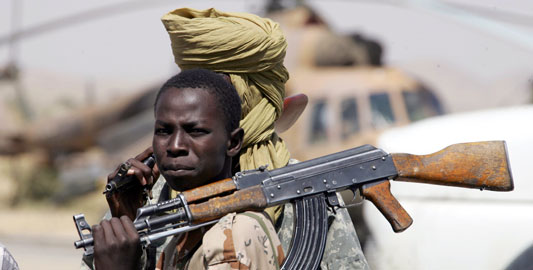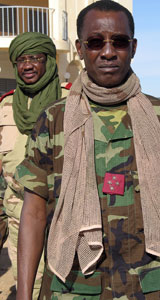Chad’s spiralling conflict
Several armed opposition groups want to overthrow Chad’s president.

 |
| The Chadian army defeated rebel fighters who reached the capital in 2006 [File: AFP] |
Four rebel groups have been fighting to overthrow Idriss Deby, Chad’s president, who seized power in a Libyan-backed uprising in 1990.
After leading a lightning three-week offensive from Sudan’s Darfur region to topple Hissene Habre, Deby became president. He was then elected in the country’s first multi-party election in 1996. In 2001 he was re-elected for a second term.
| Your Views |
|
Is Chad violence going to spill into neighbouring countries? |
However, large-scale desertions from the army in 2004 and 2005, which forced Deby to disband his presidential guard and form a new elite military force, weakened the president’s position and encouraged the growth of armed opposition groups.
The Rally for Democracy and Liberation (RDL) was formed in August 2005, and the Platform for Unity, Democracy and Change (SCUD), two months later, to overthrow the current government, accusing it of being corrupt and totalitarian.
Later that year, the RDL and SCUD joined six other groups to form the United Front for Democracy and Change (FUCD).
Ndjamena attacked
In April 2006, FUCD brought Chad to the brink of all-out civil war, crossing the entire country as far as the capital before government forces were able to repel the attack with French logistical and intelligence support.
 |
| Idriss Deby seized power in a coup in 1990 [File: AFP] |
Deby blamed the attack on the Sudanese government, claiming that many of the rebels were either Sudanese backed by their government or residents of Chad conscripted by the Sudanese.
The battle occurred just months after a conflict between Khartoum and Ndjamena had ended with the signing of the Tripoli Agreement. Deby broke off relations with Sudan as a result, expelling its diplomats and threatening to stop giving shelter to thousands of Darfur refugees.
Three weeks later Deby was re-elected for a third time, capitalising on a change to the constitution that removed a two-term limit for heads of state and an age limit of 70 for presidential candidates. The opposition boycotted the election.
In November, a state of emergency was imposed in the capital after an escalation of activity by armed rebel groups.
Peace accord
Hostilities left hundreds of people dead in clashes in the east but in October last year four rebel groups signed a peace accord with the government. Deby described it as the last chance for peace.
Mahamat Nour Abdelkerim, the leader of the FUCD, was made defence minister after the peace deal was signed.
The peace deal was undermined when Arab horsemen raided and torched villages whose inhabitants are mostly of black African descent, killing around 300 people.
In late November the accord all but totally collapsed when Abdelkerim accused Deby of ordering an attack on his fighters.
In December, Abdelkerim was removed from his position and his faction rejoined the armed opposition.
The conflict is further complicated by about 240,000 refugees from Darfur who have crossed the border and now live in a number of camps alongside about 180,000 Chadians displaced by violence.